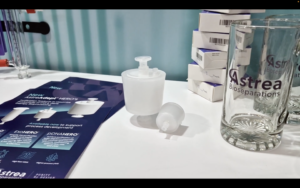
Date: Sep 21, 2023
Duration: 20 Min
Already have an account?
A year after launching LentiHero, Astrea Bioseparations returned, announcing scaled-up versions of the lentiviral vector (LVV) purification tech at Biotech Week Boston 2023.
According to Terry Pizzie, CEO of Astrea, the problem with traditional chromatography technologies is “they are not compatible with large molecules. They depend on pores within the resin, etc, which the large molecules are never going to diffuse into. You’re really restricted to the surface area of the resins. The other issue, because they’re large molecules that are delicate, they actually get damaged going through the resin.

The LentiHero technology is a nanofiber matrix, which has a large surface area with active sites all the way across and very large pore sizes. Viruses, for example, can be purified without damage, Pizzie continued.
“You’re making a difference. Before you were maybe only purifying 20% of what you wanted to recover. And now we’re probably up to towards 50 to 60% of virus that’s viable.”
The three new ranges are:
LentiHERO, a scaled-up version of the product launched last year
ExHERO, for the bioprocessing of EVs, including exosomes, as an advanced therapeutic
pDNAHERO, for Plasmid DNA in advanced therapeutic manufacture
The launch comes as part of a busy week for Astrea. On Monday, the firm announced it is building a chromatography facility in Canton, Massachusetts to support growing US demand for its products.
While the plant will not focus on Astrea’s fiber-based products, it does form an important part of the firm’s downstream growth strategy, said Pizzie.
“For the US market in particular, speed of delivery is often everything,” he said, adding: “The Boston facility is really quite versatile. We see the need to be in the US for US customers.”
As for the manufacturing of the fiber matrix products, “we have options,” we were told. “We have manufacturing in the Isle of Man. We’ve got our initial early pilot stage manufacturing plant in Cambridge [UK] as we do tech transfer. But there is also the potential that we could be looking at doing some of that in [our Stoughton facility in] Boston as well.”
About the Author
You May Also Like

schedl_b_and_w.jpg?width=100&auto=webp&quality=80&disable=upscale)
schedl_b_and_w.jpg?width=400&auto=webp&quality=80&disable=upscale)



